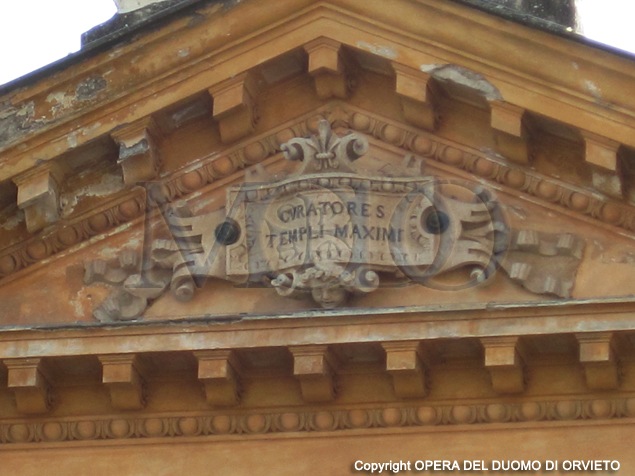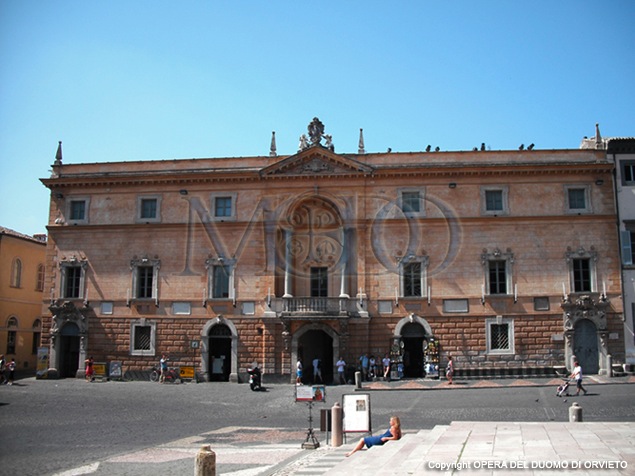Siete qui:
- Home
- The Opera del Duomo
The Opera del Duomo
 The Opera del Duomo di Orvieto, or Fabbriceria (Board of Trustees), is an autonomous body with the precise task of seeing to the maintenance and preservation of the Cathedral and of administering to its assets, including the MODO (Museum of the Opera del Duomo di Orvieto). It is the result of a complex and gradual historical process, that has passed from a simple fluid workyard organization to a precise organism with a juridical or legal personality.
The Opera del Duomo di Orvieto, or Fabbriceria (Board of Trustees), is an autonomous body with the precise task of seeing to the maintenance and preservation of the Cathedral and of administering to its assets, including the MODO (Museum of the Opera del Duomo di Orvieto). It is the result of a complex and gradual historical process, that has passed from a simple fluid workyard organization to a precise organism with a juridical or legal personality.
When the cathedral was being built, the Opera coincided with the workyard and was not at all an "independent legal subject", in view also of the strong influence of the secular power (City) and/or the ecclesiastical power (Bishop and Chapter).
The terms opera, opus, fabbrica are bivalent indicating both the works as well as the organ delegated to act as overseer and to administer the funds destined for the cathedral. Only in cases where these funds are disjoined in favor of an institution with an administrative, accounting and documentary autonomy of its own is there a "quality leap" from the work-construction yard or cathedral workshop to the Opera as juridical personality, with direct control of the works and the budget, its own personnel, its own archives.
The Opera del Duomo di Orvieto is ecclesiastic in its origins. It saw the light under the aegis of the bishop Francesco Monaldeschi and with the full support of Pope Nicholas IV, who laid the foundation stone of the cathedral in 1290. At the time of its origins the Opera was inseparable from the construction yard, with which it actually identified, and was a rather simple organism administered by an ecclesiastical rector, generally a canon or a monastery converse, elected for life and denominated operarius. He was in charge of the technical direction of the fabbrica and constantly controlled the works. At the same time he also had "economical-financial functions", receiving and administrating the bequests in favor of the cathedral.
 The building of the new cathedral church did not remain an exclusively ecclesiastic commitment for long, but soon assumed the connotation of "civic event", of which the City was not extraneous.
The building of the new cathedral church did not remain an exclusively ecclesiastic commitment for long, but soon assumed the connotation of "civic event", of which the City was not extraneous.
Initially the secular power was limited to technical aspects and support with regards to the fabbrica, furnishing specialized personnel (extimatores), but when in 1292 the popular government achieved full maturity through the new magistrature of the Signori Sette Consoli delle Arti, or Seven Lords of the Guilds, with control over the political-bureaucratic-administrative structures of the city, the need for a unifying element, symbol of civic identity and cohesion, became ever more urgent. In 1295 the City entered the organization of the construction yard and the structure of the Opera, introducing officials (soprastanti) with administrative duties, limiting the functions of the operarius to the technical aspects. The passage from the ecclesiastical rector, elected for life, to the soprastanti, nominated for fixed terms, initiated the change in the Opera.
Today the Opera del Duomo di Orvieto is a private entity with its own juridical discipline as a non-profit organization with the qualification of ONLUS (organization non profit of social utility), a juridical status the Opera del Duomo di Orvieto acquired in 1998.
The management is entrusted to a Board of Directors, with three-year terms, composed of seven members, residents in the city of Orvieto and of Catholic faith, nominated by the Bishop (two members) and the Minister of the Interior, advised by the diocesan Ordinary (five members). The President is elected by secret vote by the members of the Board of Directors, then formally nominated by the Minister of the Interior.
For further information see www.opsm.it




